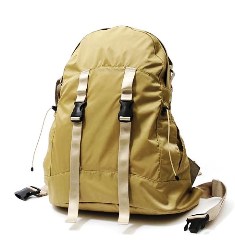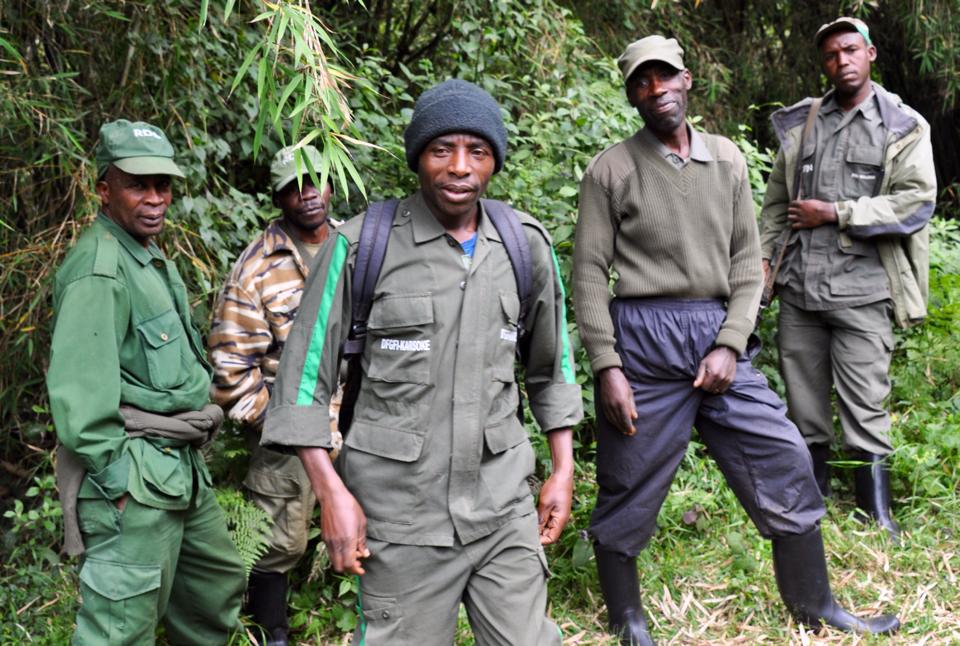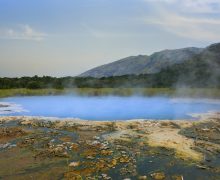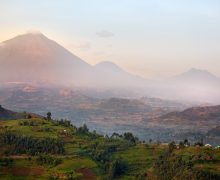GEAR PACKING LIST
The following packing list is only meant as a guideline as you may have your own preferences. The quantities listed below will vary depending on the length of your trip.
Clothing
 Waterproof Jacket
Waterproof Jacket
Soft Jacket, fleece or soft-shell
Long Sleeve Shirt, light-weight (2)
Short Sleeve Shirt, light-weight (2)
Hiking Pants (convertible to shorts recommended) (2)
Shorts (optional)
Underwear, briefs (3)
Sleepwear
Swimsuit (optional)
Footwear
Hiking Boots or Trail Shoes
Sandals
Socks (3)
Accessories
Sunglasses
Brimmed Hat, for sun protection
Gloves, gardening or similar (for gorilla trekking)
Poncho, during rainy season (optional)
Stuff Sacks or Plastic Bags, to keep items dry
Equipment
Daypack, for you to carry your personal gear
Flashlight
Other
Toiletries
Prescriptions
Sunscreen
Lip Balm
Insect Repellent, containing DEET
Binoculars
First Aid Kit
Hand Sanitizer
Pencil and Notebook, miniature, for trip log (optional)
Camera, with extra batteries (optional)
Paperwork
Trip Receipt
Passport
Visa (available at EBB)
Immunization Papers
Insurance Documents
We recommend shopping online at REI, backcountry.com, and altrec.com for all of your gear needs.
TRAINING
Trekking is a physical undertaking, so you should prepare yourself accordingly. Being in good shape is important in many respects. The best and exercise to do is hiking. Ideally, you should try to hike as much as possible . Doing day hikes is superb training.
 For those who do not have access to trails, but have membership to a gym, you can train very productively on a stair master machine or treadmill. If you have no access to trails or a gym, then try to walk as much as you can, with extended walks on the weekends.
For those who do not have access to trails, but have membership to a gym, you can train very productively on a stair master machine or treadmill. If you have no access to trails or a gym, then try to walk as much as you can, with extended walks on the weekends.
Clients with questionable health should have a medical check prior to their trip. Persons not fit for long trips due to heart disease, chronic illness, physical handicap, advanced pregnancy or mental illness are advised not to participate in such rigorous travel programs. Ask your doctor if trekking is permissible for your age, fitness level and health condition. Ask if you have any preexisting medical conditions that can cause problems on the trip.
ENTRY REQUIREMENTS
All travelers to Uganda are required to strictly conform with the following requirements.
- You must be in possession of a valid passport issued and recognized by your government.
- You must have an International immunization Certificate against Yellow Fever.
- You must obtain a visa if you are an American, British National or European National.
 Countries exempted from Visa requirements to Uganda include; COMESA countries:
Countries exempted from Visa requirements to Uganda include; COMESA countries:
Kenya, Angola, Rwanda, Burundi, Zimbabwe, Comoros, Eritrea, Malawi, Mauritius, Madagascar, Seychelles, Swaziland, Tanzania, and Zambia, Antigua, Jamaica, Cyprus, Bahamas, Barbados, Sierra Leone, Belize, Fiji, Gambia,Grenada, Malta, Tonga, Singapore, Lesotho, Solomon Islands, St.Vincent & The Grenadines,
Vanuatu, Italy (Only Diplomatic Passports).
Uganda visas are available at entry points including Entebbe International airport. The cost for a single entry visa is $100.
For those visiting Rwanda, USA citizens are required to have a visa. A tourist visa, valid for a period up to 30 days, can be purchased upon arrival for $30 at Kigali International Airport and other points of entry. Nationals of Australia, Germany, Israel, New Zealand, Republic of South Africa, Sweden, and United Kingdom also will be issued with entry visa upon arrival for $30 without prior application. Other nationals have to get their visas before proceeding to the border.
VACCINATIONS AND IMMUNIZATIONS
Vaccine recommendations are based on the best available risk information. Please note that the level of risk for vaccine-preventable diseases can change at any time. The following information was obtained from the Center for Disease Control and Prevention, Uganda.
Recommended Vaccinations and Preventive Medications
The following vaccines may be recommended for your travel to East Africa. Discuss your travel plans and personal health with a health-care provider to determine which vaccines you will need.
- Routine. Recommended if you are not up-to-date with routine shots such as, measles/mumps/rubella (MMR) vaccine, diphtheria/pertussis/tetanus (DPT) vaccine, poliovirus vaccine, etc.
- Hepatitis A or immune globulin (IG). Recommended for all unvaccinated people traveling to or working in countries with an intermediate or high level of hepatitis A virus infection (see map) where exposure might occur through food or water. Cases of travel-related hepatitis A can also occur in travelers to developing countries with "standard" tourist itineraries, accommodations, and food consumption behaviors.
- Hepatitis B. Recommended for all unvaccinated persons traveling to or working in countries with intermediate to high levels of endemic HBV transmission (see map), especially those who might be exposed to blood or body fluids, have sexual contact with the local population, or be exposed through medical treatment (e.g., for an accident).
- Malaria: your risk of malaria may be high in all countries in East Africa, including cities. See your health care provider for a prescription antimalarial drug.
- Meningococcal (meningitis). Recommended if you plan to visit countries that experience epidemics of meningococcal disease during December through June.
- Typhoid. Recommended for all unvaccinated people traveling to or working in East Africa, especially if staying with friends or relatives or visiting smaller cities, villages, or rural areas where exposure might occur through food or water.
- Polio. Recommended for adult travelers who have received a primary series with either inactivated poliovirus vaccine (IPV) or oral polio vaccine (OPV). They should receive another dose of IPV before departure. For adults, available data do not indicate the need for more than a single lifetime booster dose with IPV.
- Rabies. Recommended for travelers spending a lot of time outdoors, especially in rural areas, involved in activities such as bicycling, camping, or hiking. Also recommended for travelers with significant occupational risks (such as veterinarians), for long-term travelers and expatriates living in areas with a significant risk of exposure, and for travelers involved in any activities that might bring them into direct contact with bats, carnivores, and other mammals. Children are considered at higher risk because they tend to play with animals, may receive more severe bites, or may not report bites.
- Yellow Fever. Recommended for all travelers >9 months of age. Uganda and Rwanda requires travelers arriving from countries with risk of yellow fever virus transmission to present proof of yellow fever vaccination. Vaccination should be given 10 days before travel and at 10-year intervals if there is ongoing risk. Find an authorized U.S. yellow fever vaccination clinic.
 To stay healthy, do...
To stay healthy, do...
- Wash your hands often with soap and water or, if hands are not visibly soiled, use a waterless, alcohol-based hand rub to remove potentially infectious materials from your skin and help prevent disease transmission.
- In developing countries, drink only bottled or boiled water, or carbonated (bubbly) drinks in cans or bottles. Avoid tap water, fountain drinks, and ice cubes. If this is not possible, learn how to make water safer to drink.
- Take your malaria prevention medication before, during, and after travel, as directed. (See your health care provider for a prescription.)
- To prevent fungal and parasitic infections, keep feet clean and dry, and do not go barefoot, even on beaches.
- Always use latex condoms to reduce the risk of HIV and other sexually transmitted diseases.
- Protect yourself from mosquito insect bites: Wear long-sleeved shirts, long pants, and hats when outdoors. Use insect repellents that contain DEET (N, N-diethylmethyltoluamide). If no screening or air conditioning is available: use a pyrethroid-containing spray in living and sleeping areas during evening and night-time hours; sleep under bed nets, preferably insecticide-treated ones.
Do not…
- Do not eat food purchased from street vendors or food that is not well cooked to reduce risk of infection (i.e., hepatitis A and typhoid fever).
- Do not drink beverages with ice.
- Avoid dairy products, unless you know they have been pasteurized.
- Do not swim in fresh water to avoid exposure to certain water-borne diseases such as schistosomiasis.
- Do not handle animals, especially monkeys, dogs, and cats, to avoid bites and serious diseases (including rabies and plague). Consider pre-exposure rabies vaccination if you might have extensive unprotected outdoor exposure in rural areas.
- Do not share needles for tattoos, body piercing or injections to prevent infections such as HIV and hepatitis B.
- Avoid poultry farms, bird markets, and other places where live poultry is raised or kept.
TRAVEL INSURANCE
Travel insurance is required to participate on this trip.
Trip deposits are non-refundable and balance payments are only partially refundable. Therefore, it is prudent for you to protect your investment against trip cancellation, interruption, delays and unforeseeable expenses. Standard travel insurance provides coverage for trip cancellation, interruption and delay; lost, stolen and damaged baggage; medical expenses and emergency medical evacuation; and luggage delay.
At a minimum, the insurance should protect you against trip cancellation and trip interruption, should you need to cancel your trip due to circumstances such as injuries or sickness or emergencies.
For our customers residing in the USA, we recommend that you obtain Travel Guard's Silver, Gold or Platinum plans, which provide coverage for trip cancellation, interruption and delay; lost, stolen and damaged baggage; medical expenses and emergency medical evacuation; and luggage delay, for a low cost. You can purchase the Silver, Gold or Platinum plans online through Travel Guard.
For our international customers, we recommend that you obtain travel insurance through World Nomads.
Clients are strongly advised to obtain travel insurance immediately after booking their trip. Clients must be able to provide proof of insurance to staff upon request.
FLIGHTS
Our trips originate in Kampala, the capital of Uganda. Kampala is a short drive from the Entebbe International Airport (airport code: EBB). If you fly into Entebbe International Airport, you can communicate your flight information to us, and we can arrange for transport from the airport to the hotel for a fee. A number of international airlines operate direct flights to Entebbe, these airlines include: British Airways, SN Brussels, Kenya Airways, KLM, Emirates, South Africa Airways, Egypt Air and Ethiopian Airways, and Emirates. Other Airlines include the Domestic and regional operators.
KLM flies to Entebbe International Airport regularly.
Vayama is a good source for domestic Ugandan flights.









